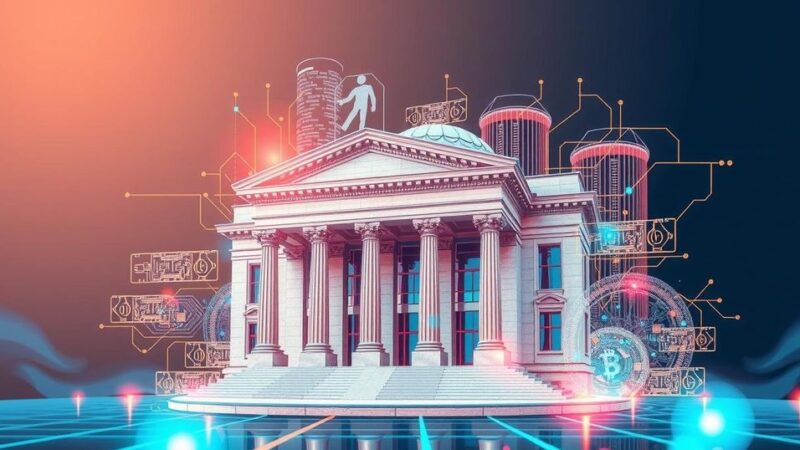On October 1, 2023, Argentine Vice President Victoria Villaruel met with El Salvador’s President Nayib Bukele to discuss Bitcoin and the volcano bonds, as Argentina considers potential cryptocurrency strategies amid its economic struggles. The initiative aims to generate funds through Bitcoin mining and establish a Bitcoin city, although it has faced delays. This conversation highlights Argentina’s interest in similar economic pathways, driven by ongoing inflation and instability.
On October 1st, during an official visit by El Salvador’s President Nayib Bukele to Argentina, Vice President Victoria Villaruel engaged in a significant dialogue regarding the Central American nation’s innovative utilization of Bitcoin, particularly the Bitcoin volcano bonds. This meeting raised speculation surrounding the potential for Argentina’s entry into the cryptocurrency sector, motivated by its ongoing struggle with severe economic issues, including rampant inflation and joblessness. The concept of volcano bonds, introduced by El Salvador, is pivotal to their Bitcoin strategy, aimed at generating $1 billion while establishing a Bitcoin-powered city utilizing volcanic energy. Despite initial optimism and plans to launch this initiative in early 2024, the project remains unrealized, revealing challenges that El Salvador faces in fully implementing its Bitcoin agenda. Villaruel expressed a profound interest in the existing mechanics of the volcano bond project, indicating an inclination towards exploring similar paths for Argentina’s economic recovery. Furthermore, recent remarks from President Bukele highlighted a disparity between expectations and the actual pace of Bitcoin adoption in El Salvador. Despite these challenges, Argentina’s political leaders are examining the opportunities presented by cryptocurrency for stabilizing their economy and potentially attracting foreign investment. Under the leadership of President Javier Milei, who campaigned on a platform advocating for Bitcoin adoption, there is an emerging sentiment towards leveraging this digital asset to mitigate the adverse economic conditions that have gripped the nation. However, it is worth noting that the distinct geographical and economic contexts of El Salvador and Argentina may influence the applicability of solutions in one nation to the other. Thus, while the intrigue surrounding El Salvador’s Bitcoin projects signals a potential shift in cryptocurrency adoption within Argentina, officials must carefully weigh the unique challenges and outcomes that could arise from pursuing similar initiatives.
In 2021, El Salvador made a landmark decision by adopting Bitcoin as legal tender, positioning itself as a pioneer in the cryptocurrency space. This move has invited scrutiny from neighboring countries, particularly Argentina, which faces its own economic tribulations, including high inflation rates and unemployment. The ongoing developments of El Salvador’s Bitcoin volcano bonds project aim to leverage the nation’s volcanic energy resources to finance infrastructure through cryptocurrency, reflecting a broader trend among South American nations exploring financial innovation to address economic instability. The recent dialogue between Vice President Villaruel and President Bukele underscores a growing interest among Argentine leaders in potential crypto solutions to their current financial crises.
The discussions between Vice President Victoria Villaruel of Argentina and President Nayib Bukele of El Salvador about Bitcoin and the volcano bonds illustrate a growing interest within Argentina to explore innovative economic strategies in light of its financial difficulties. Despite the challenges faced by El Salvador in fully implementing its cryptocurrency initiatives, Argentina’s potential move towards adopting Bitcoin strategies could represent an important step in harnessing digital currency for economic revitalization. However, careful consideration of the distinct economic contexts of the two nations is essential for any successful adaptation of such initiatives.
Original Source: www.ccn.com







